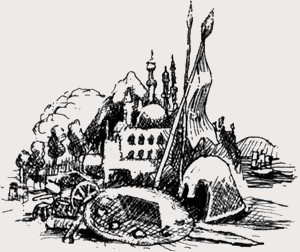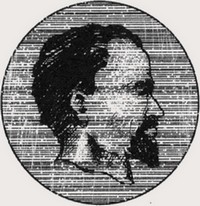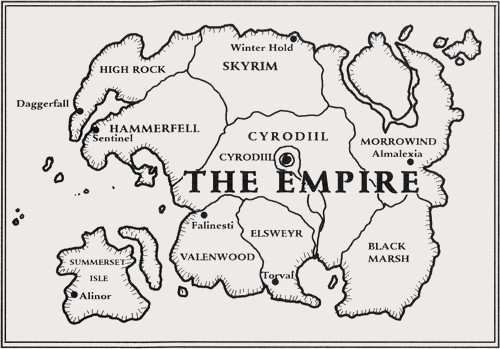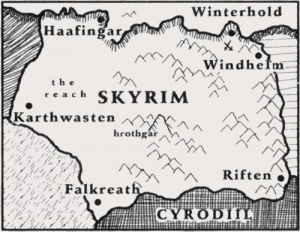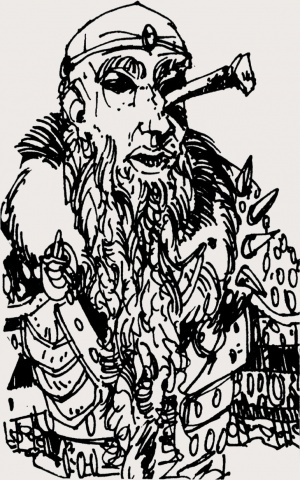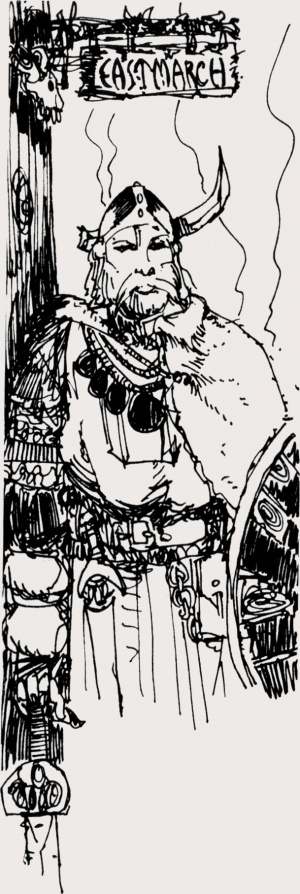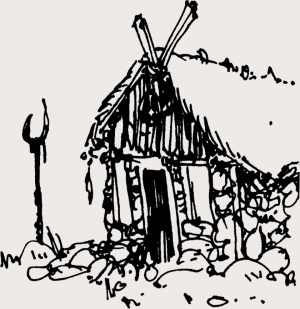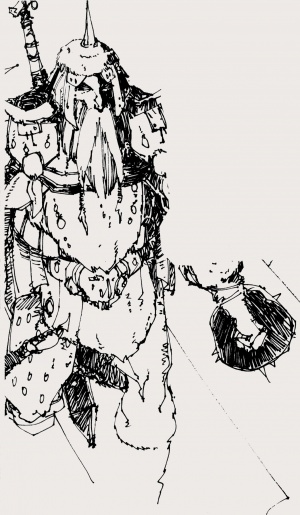Guide de poche de l'Empire, Première édition
Note : Ce livre est annoté par "YR", un elfe transmettant le présent guide à son oncle accompagné de la lettre suivante. Les annotations écrites comme ceci : Mot commenté (Annotation de YR).
Severest Uncle,
Before taking my post as military attache in the so-called Imperial City (a foreshadowing of the pretentions of these humans), I took your advice and made a sojourn across the Outerlands, both within this newborn Empire and those regions it has get to acquire ~
Make no mistake, Talos (now Tiber Septim in resplendant Cyrodilic) is still on the ascendant. I now believe the oracles have been badly misinterpreted - Septim may indeed be the Dragonborn as foretold. The Mer must unite at last or be consumed one by one. Father, blessed be his name's numeric mystery, was one of the few on the Thalmor to oppose Andel Crodo's policy of nonintervention that if continued will be the doom of all Elder Races. I understand that my present assignment is intended as a punishment for not following in my father's footsteps, but I urge you to overlook our personal disagreements and to relay my findings to the full Council.
I forward this pamphlet as a sample of the official propaganda from Septim's regime, annotated with my own observations, which while not tempered by age and wisdom are yet valuable as a record of a naive traveller
~YR
to
THE EMPIRE
and its environs
Being a Description of the Lands and the
Divers Customs of the Inhabitants
and furthermore a useful history of those places of interest
by Nature of their Locations & Influence.
Dedicated
To the unswerving Commitment to Truth and Knowledge
of His Most Discerning Majesty the Emperor Tiber Septim
Promulgated under the Authority of the Imperial Geographical Society
CE 864
Scions of Emperors, King of Earth and Sky,
Lord of Shining Hosts,
Protector of Oathman, Freeman and Yeoman,
Guarantor of Right and Justice,
Broad Blessing of Thrones and Powers,
Cynosure of Celestial Glory,
The Most High Tiber Septim
| The 8 Invocations and 16 acceptable Blasphemes.
To AKATOSH whose perch from Eternity allowed the Day. .noitaripsnI fo tnuoF eht HAIHTEOB oT |
Welcome, citizen!
With the dawn of a new era before us, it is time that we take stock of where we have been and where we are, in order to better illuminate the way ahead. Written in celebration of the Battle of Hunding Bay, which marked the return of all human kingdoms to the unchallenged rule (this remains to be seen) of the Cyrodilic Emperor, this pamphlet seeks to briefly describe the present provinces of the Empire and the surrounding regions-- their history, people and current condition. We strove to balance timeliness with accuracy and completeness; if we have erred in our zeal to place this valuable guide in the hands of interested citizens everywhere, we beg the kind reader's indulgence.
The Empire stretches across Tamriel, the largest known continent of the World. To the north of Tamriel is Atmora, from whence the Men of the World came. To the west is Yokuda, the lost native land of the Redguards. To the east is Akavir, whose armies invaded Tamriel in the previous era. To the south all is mystery and the whisper of a lost Elven homeland (So, even the humans have heard of Old Ehlnofey).
Tamriel itself is generally divided into eight major regions: Skyrim, Cyrodiil, High Rock, the Aldmeri Dominion of the Summerset Isles and Valenwood, Hammerfell, Morrowind, and the Elsweyr Confederacy. Some of these, such as Morrowind or Skyrim, have historically been unified into kingdoms; others, such as High Rock or Elsweyr, are looser groupings of many kingdoms, chiefdoms, village confederations, and so forth, united under a dominant race or culture. At its zenith, the Second Empire formally organized these disparate groups into the Imperial Provinces, which were administered by provincial governors, either dispatched directly from Cyrodiil or appointed from the native populations. (Morrowind is a notable exception, having never been conquered by the original Cyrodilic Empire and, thus escaping investment as an Imperial Province.). With the fall of the Cyrodilic Empire, control reverted to the individual rulers of each province, resulting in centuries of chaos, as many of the provinces devolved into independent kingdoms and petty statelets. Now, happily, all of the human kingdoms have been recovered by the Third Empire of Tiber Septim, and once again they all bear the proud title of Imperial Provinces (Breathtaking arrogance!).
The Aldmeri Dominion, the Elsweyr Confederacy, and Morrowind have yet to join the Empire, but are described in this book for the edification of the scholar, the fascination of the common citizen, and the preparation of the soldier. The Third Empire is yet in its youth, and who can predict what new horizons might yet greet the dawn under the Red Diamond Banner?
Some regions escape provincial classification due to the primitive civilization of their beastfolk inhabitants. Collectively, these beastfolk 'states' are known as the Wild Regions, which may or may not be of interest to the Emperor. They are included only for the most intrepid of travelers, and to throw the achievements of Civilization into more brilliant relief by contrast with these benighted corners of Tamriel.
Now, citizen, we entreat you to review our modest survey of the Empire's dominions. If it entertains and edifies, reflect not upon the humble labors of this scribe, but on the gracious benevolence of our beloved Emperor, whose very name is as ambrosia upon our tongues, who in his wisdom has ordained that this survey be created and distributed among the earnest and wise people of Tamriel, that they might better understand the glories and challenges of these Lands and Dominions, and that they might better appreciate the great burdens of rulership he bears in our names with such fortitude.
A note on Elven designations: The Elves as a whole are sometimes referred to as the 'Aldmeri,' or 'the Elder Races.' Their individual pedigrees (Dangerous racialism - there shall be no accomodation as with Reman.) are likewise referred to by both their human and Aldmeri names; thus, High Elves are the 'Altmer,' Dark Elves the 'Dunmer,' Wood Elves the 'Bosmer,' etc., etc. 'Mer' is also used to denote a single Elf. Words that designate an Elven member of a profession or trade can therefore correctly be said as 'craftsmer,' for example, or 'noblemer.
Skyrim, also known as the Old Kingdom or the Fatherland, was the first region of Tamriel settled by humans: the hardy, brave, warlike Nords, whose descendants still occupy this rugged land, and, although perhaps somewhat reduced from the legendary renown of their forebears of old, the Nords of the pure blood still unquestionably surpass the mixed races in all the manly virtues.
Exactly when the Nords first crossed the ice-choked Sea of Ghosts from Atmora, their original homeland, is uncertain. As recorded in the Song of Return, Ysgramor and his family first landed in Tamriel at Hsaarik Head, at the extreme northern tip of Skyrim's Broken Cape, fleeing civil war in Atmora (then rather warmer than at present, as it seems to have supported a substantial population). These first settlers named the land "Mereth", after the Elves that roamed the untamed wilderness which then covered the whole of Tamriel. For a time, relations between Men and Elves were harmonious, and the Nords throve in the new land, summoning more of their kin from the North to build the city of Saarthal, the site of which has recently been located by Imperial archaeologists in the vicinity of modern Winterhold. But the Elves saw that the vital young race would soon surpass their stagnant culture (!) if left unchecked, and fell upon the unsuspecting Nords in the infamous Night of Tears; Saarthal was burned, and only Ysgramor and two of his sons (Ysgramor's provocations and blasphemies have, of course, been long forgotten ~) fought free of the carnage and escaped to Atmora. The Elves, however, had reckoned without the indomitable spirit of the Nords. Gathering his legendary Five Hundred Companions (whose names are still recited every Thirteenth of Sun's Dawn at the Feast of the Dead in Windhelm), Ysgramor returned to Tamriel with a vengeance, driving the Elves out of Skyrim and laying the foundations of the first human Empire.
It may be that the exploits of the near-mythical Ysgramor conflate the reigns of several early Nord Kings, as the Elves were not finally driven from the present boundaries of Skyrim until the reign of King Harald, the thirteenth of Ysgramor's line, at the dawn of recorded history. King Harald is also remembered for being the first King to relinquish all holdings in Atmora; the Nords of Skyrim were now a separate people, whose faces were turned firmly toward their destiny, the conquest of the vast new land of Tamriel. Indeed, the history of the Nords is the history of humans in Tamriel; all the human races, with the exception of the Redguards, are descended from Nordic stock, although in some the ancient blood admittedly runs thin.
| Snow Elves Nords attribute almost any misfortune or disaster to the machinations of the Falmer, or Snow Elves, be it crop failure, missing sheep, or a traveler lost crossing a high pass. These mythical beings are popularly believed to be the descendants of the original Elven population, and are said to reside in the remote mountain fastnesses that cover most of Skyrim. However, there is no tangible evidence that this Elven community survives outside the imaginations of superstitious villagers. |
King Vrage the Gifted began the expansion that led to the First Empire of the Nords. Within a span of fifty years, Skyrim ruled all of northern Tamriel, including most of present-day High Rock, a deep stretch of the Nibenay Valley, and the whole of Morrowind. The Conquest of Morrowind was one of the epic clashes of the First Era, when ensued many a desperate contest between Nord and Dark Elf in the hills and glades of that dire kingdom, still recalled by the songs of the minstrels in the alehouses of Skyrim. The system of succession in the First Empire is worthy of note, as it proved in the end to be the Empire's undoing. By the early years of the First Empire, Skyrim was already divided into Holds, then ruled by a patchwork of clan-heads, kings, and councils (or moots), all of which paid fealty to the King of Skyrim. During the exceptionally long reign of King Harald, who died at 108 years of age and outlived all but three of his sons, a Moot was created, made up of representatives from each Hold, to choose the next King from qualified members of the royal family. Over the years, the Moot became permanent and acquired an increasing amount of power; by the reign of King Borgas, the last of the Ysgramor dynasty, the Moot had become partisan and ineffective. Upon the murder (righteous slaying) of King Borgas by the Wild Hunt (see Aldmeri Dominion - Valenwood), the Moot's failure to appoint the obvious and capable Jarl Hanse of Winterhold sparked the disastrous Skyrim War of Succession, during which Skyrim lost control of its territories in High Rock, Morrowind, and Cyrodiil, never to regain them. The war was finally concluded in 1E420 with the Pact of Chieftans; henceforth, the Moot was convened only when a King died without direct heirs, and it has fulfilled this more limited role admirably. It has only been called upon three times in the intervening millenia, and the Skyrim succession has never again been disputed on the field of battle.
The land of Skyrim is the most rugged on the continent, containing four of the five highest peaks in Tamriel (see Places of Note: Throat of the World). Only in the west do the mountains abate to the canyons and mesas of the Reach, by far the most cosmopolitan of the Holds of Skyrim, Nords of the pure blood holding only the barest majority according to the recent Imperial Census. The rest of Skyrim is a vertical world: the high ridges of the northwest-to-southeast slanting mountain ranges, cleft by deep, narrow valleys where most of the population resides. Along the sides of the river valleys, sturdy Nord farmers raise a wide variety of crops; wheat flourishes in the relatively temperate river bottoms, while only the snowberry bushes can survive in the high orchards near the treeline. The original Nord settlements were generally established on rocky crags overlooking a river valley; many of these villages still survive in the more isolated Holds, especially along the Morrowind frontier. In most of Skyrim, however, this defensive posture was deemed unnecessary by the mid-first era, and most cities and towns today lie on the valley floors, in some cases still overlooked by the picturesque ruins of the earlier settlement.
| "The Tongues" The Nords have long practiced a spiritual form of magic known as "The Way of the Voice", based largely on their veneration of the Wind as the personification of Kynareth. Nords consider themselves to be the children of the sky, and the breath and the voice of a Nord is his vital essence. Through the use of the Voice, the vital power of a Nord can be articulated into a thu'um, or shout. Shouts can be used to sharpen blades or to strike enemies at a distance. Masters of the Voice are known as Tongues, and their power is legendary. They can call to specific people over hundreds of miles, and can move by casting a shout, appearing where it lands. The most powerful Tongues cannot speak without causing destruction. They must go gagged, and communicate through a sign language and through scribing runes. In the days of the Conquest of Morrowind and the founding of the First Empire, the great Nord war chiefs - Derek the Tall, Jorg Helmbolg, Hoag Merkiller - were all Tongues. When they attacked a city, they needed no siege engines; the Tongues would form up in a wedge in front of the gatehouse, and draw in breath. When the leader let it out in a thu'um, the doors were blown in, and the axemen rushed into the city. Such were the men that forged the First Empire. But, alas for the Nords, one of the mightiest of all the Tongues, Jurgen Windcaller (or The Calm, as he is better known today), became converted to a pacifist creed that denounced use of the Voice for martial exploits. His philosophy prevailed, largely due to his unshakable mastery of the Voice -- his victory was sealed in a legendary confrontation, where The Calm is said to have "swallowed the Shouts" of seventeen Tongues of the militant school for three days until his opponents all lay exhausted (and then became his disciples). Today, the most ancient and powerful of the Tongues live secluded on the highest peaks in contemplation, and have spoken once only in living memory, to announce the destiny of the young Tiber Septim (as recounted in Cyrodiil). In gratitude, the Emperor has recently endowed a new Imperial College of the Voice in Markarth, dedicated to returning the Way of the Voice to the ancient and honorable art of war. So it may be that the mighty deeds of the Nord heroes of old will soon be equaled or surpassed on the battlefields of the present day. Septim's new college is staffed by hacks and charlatans -- the so-called Grand Master is said to have formerly earned his living as a street performer in Windhelm -- the students are scions of the most obsequious Nord families, hoping to curry favor with Tiber Septim's New Order ~ |
Nords are masters of wood and timber construction; many structures survive in use today that were built by the first settlers over 3,000 years ago. A fine example of Nord military engineering can be seen at Old Fort, one of the royal bastions constructed by the First Empire to guard its southern frontier. Towering walls of huge, irregular porphyry blocks fit together without seam or mortar, as if constructed by mythical Elhnofey rather than men.
The nine Holds present a varied aspect in people, government, and trade. The Reach could be mistaken for one of the petty kingdoms of High Rock; it is full of Bretons, Redguards, Cyrodiils, Elves of all stripes, and even a few misplaced khajiit. The northern and western Holds -- Winterhold, Eastmarch, Rift, and the Pale, known collectively as the Old Holds -- remain more isolated, by geography and choice, and the Nords there still hold true to the old ways. Outsiders are a rarity, usually a once-yearly visit from an itinerant peddler. The young men go out for weeks into the high peaks in the dead of winter, hunting the ice wraiths that give them claim to full status as citizens (a laudable practice that could serve as a model for the more "civilized" regions of the Empire). Here, too, the people still revere their hereditary leaders, while the other Holds have long been governed (after a fashion) by elected moots. It is fortunate for Skyrim and the Septim Empire that the people of the Old Holds have preserved the traditions of their forefathers. Skyrim has long been dormant, slumbering through the millenia while upstart conquerors bestrode the Arena of Tamriel. But now, a son of Skyrim (a disputed claim ~) once again holds the world's destiny in his hands. If Skyrim is to awake, its rebirth will be led by these true Nords who remain its best hope for the future.
Places of Note:
Haafingar (Solitude)
The home of the famous Bards' College, Haafingar is also one of Skyrim's chief ports, and ships from up and down the coast can be found at her crowded quays, loading timber and salted cod for the markets of Wayrest, West Anvil, and Senchal. Founded during Skyrim's long Alessian flirtation, the Bards' College continues to flaunt a heretical streak, and its students are famous carousers, fittingly enough for their chosen trade. Students yearly invade the marketplace for week of revelry, the climax of which is the burning of "King Olaf" in effigy, possibly a now-forgotten contender in the War of Succession. Graduates have no trouble finding employment in noble households across Tamriel, including the restored Imperial Court in Cyrodiil, but many still choose to follow in the wandering footsteps of illustrious alumni such as Callisos and Morachellis.
Windhelm
Once the capital of the First Empire, the palace of the Ysgramor dynasty still dominates the center of the Old City. Windhelm was sacked during the War of Succession, and again by the Akaviri army of Ada'Soon Dir-Kamal; the Palace of the Kings is one of the few First Empire buildings that remains. Today, Windhelm remains the only sizable city in the otherwise determinedly rural Hold of Eastmarch, and serves as a base for Imperial troops guarding the Dunmeth Pass into Morrowind.
Throat of the World
This is the highest mountain in Skyrim, and the highest in Tamriel aside from Vvardenfell in Morrowind. The Nords believe men were formed on this mountain when the sky breathed onto the land. Hence the Song of Return refers not only to Ysgramor's return to Tamriel after the destruction of Saarthal, but to the Nords' return to what they believe was their original homeland. Pilgrims travel from across Skyrim to climb the Seven Thousand Steps to High Hrothgar, where the most ancient and honored Greybeards dwell in absolute silence in their quest to become ever more attuned to the voice of the sky.
En cours...
